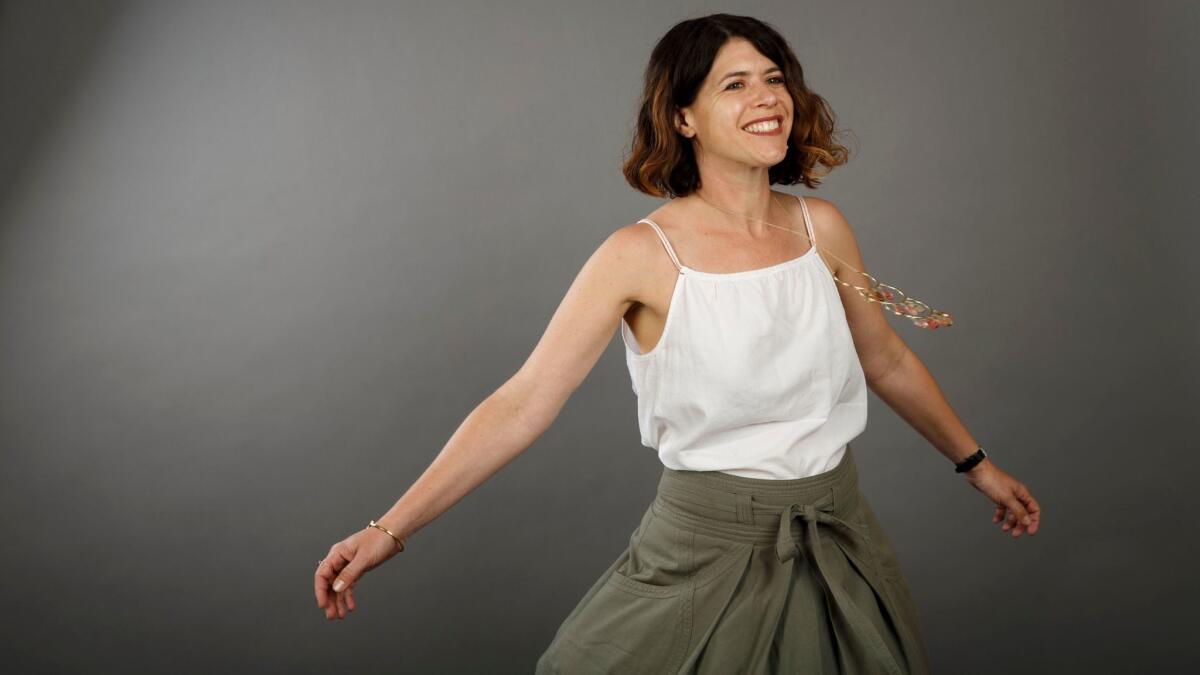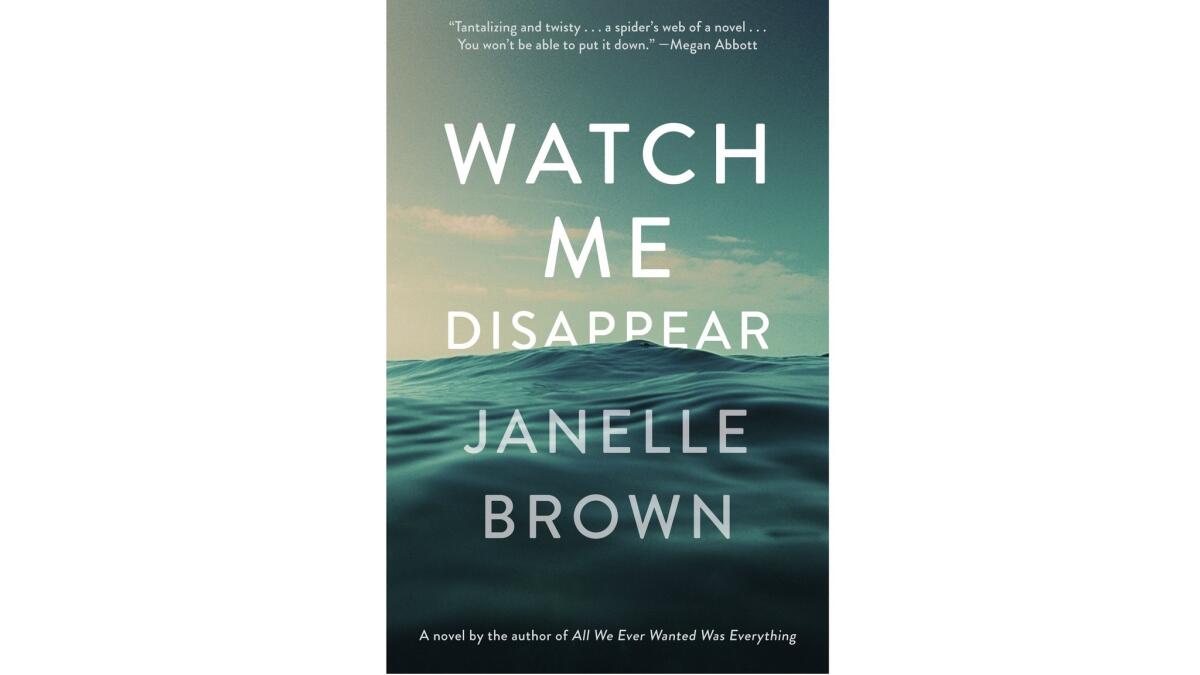Q&A: Janelle Brown on taboos, motherhood and her novel ‘Watch Me Disappear’

In her work and in her life, Janelle Brown sticks close to home. A Bay Area native, she got her bachelor’s in English at UC Berkeley, then worked as a staff writer for San Francisco-based Wired and Salon.com through the dotcom boom of the ’90s. In 2002 she followed the filmmaker she was dating to Los Angeles. “Thank God it worked out,” she told me. “We just celebrated our 12th anniversary.”
Brown doesn’t roam far afield in her fiction, either. “My books tend to be page-turners with dysfunctional family relationships at their hearts,” she says with characteristic bluntness. Her first novel, “All We Ever Wanted Was Everything,” (2008), was a satirical romp through the new-moneyed Silicon Valley suburbs. Her second, “This Is Where We Live” (2010), was a poignant sendup of Los Angeles’ hipster culture. In “Watch Me Disappear,” out now from Spiegel & Grau, Brown returns to Berkeley, where a seemingly happy family has come undone in the wake of a mother’s disappearance.
On the umpteenth day of L.A.’s latest heat wave, Brown and I fanned ourselves and chatted in the backyard of the comfy-chic Silver Lake home she shares with her husband, their 5-year-old son and their 8-year-old daughter.
Your reading at Skylight Books was packed with your many, many Los Angeles friends and fans. How does living in L.A. affect you as a writer?
There was so much anti-L.A. rhetoric floating around San Francisco, I was afraid I wouldn’t find my people here. The opposite turned out to be true. L.A. is a literary city full of smart, interesting people doing smart, interesting things — and doing them from outside the confines of the traditional routes. If you want to be a writer, you’re supposed to move to New York, not L.A. So the writers who come here approach their careers from a different direction, and they come together like magnets.
In 2006, the
Your first novel was a huge hit. How did that set up the rest of your career?
Everyone told me first novels don’t get published. I was thrilled when mine sold to a publisher. I figured if I was lucky a couple of people would read it. Then it became a New York Times bestseller. That was a total surprise. But you don’t necessarily get to stay on that train forever. My second book wasn’t a bestseller, which is one reason this third novel took me so long. I was trying to figure out what’s marketable, which was the wrong way to go.

Unlike your first two novels, “Watch Me Disappear” is a thriller. What made you decide to take that turn?
Some writers sit down with a master plan. It might behoove me to be that writer, but I’m not. I learn as I go, which means a lot of what I write ends up in the trash.
Before I started “Watch Me Disappear,” when I was pregnant with my son, I spent a year working on a dystopian novel. Then I realized there was a glut of dystopian fiction on the market. I walked away from writing for six months. I’d show up to pick up my daughter at preschool every day and burst into tears. I thought my career was over. I couldn’t sleep. But I stuck it out, and finally I came up with this idea.
The novel evolved a lot. I didn’t expect it to be a mystery. I thought it was a meditation on grief, memory, the brain. The first drafts had all these convoluted subplots; too much going on but no focus. I had to do a lot of stripping back the layers to figure out what it could be. I recently reread the hundred pages I sent to a friend. There’s almost nothing in the current book from those hundred pages.

The plot of “Watch Me Disappear” is not a new one. A woman disappears, like in “Gone Girl” and “Wild.” A mother leaves a father to raise his daughter alone, as Lisa did to Nate in “Six Feet Under.” Was it difficult to lend your own twist to a familiar theme?
It was tricky in the writing; I didn’t want it to rip off everything that’s already been written. But I also think there’s a reason we’re fascinated by the idea of disappearing. It’s the last thing you’re supposed to do — one of the great taboos. You don’t just ditch the people you love. When someone disappears, the question is, has something horrible been done to her, or has she done something horrible? Either way, it’s thrilling.
This is the first novel you’ve written since becoming a mom — and your protagonist, Billie, is a neglectful mother who walks away from her family. Explain, please!
To state the obvious, motherhood is an emotionally and physically challenging role to take on — more so when you’re writing a book. My pre-motherhood writing days started at 4 in the afternoon and went on for as long as I wanted. Now my writing day is over at 3:45 when I pick up my kids at school. It’s much harder to focus.
Billie became a repository for all the conflicting feelings I have about motherhood. There are moments when your kids are crying downstairs and you’re upstairs reading your Twitter feed, or you realize you’re trying to mold your children into yourself, and you see that potential within you to be the terrible mother you don’t want to be. I’ve talked to so many women who have had the thought, “I just want to walk away,” even though 99.9% of us would never do it. Through Billie, I got to live out that fantasy.
What would be your dream come true for this book?
What gives me the most joy when I publish a book is hearing from readers who say they were affected by it. [Laughs] Oh, and I’d also love for it to be a No. 1 New York Times bestseller, and for Oprah to love it, and to have people lining up to tell me how much it meant to them. We all want that, don’t we?
Maran is the author, most recently, of the memoir “The New Old Me.” She’s on Twitter @meredithmaran and in Silver Lake in a 1926 bungalow.
Sign up for our Book Club newsletter
Get the latest news, events and more from the Los Angeles Times Book Club, and help us get L.A. reading and talking.
You may occasionally receive promotional content from the Los Angeles Times.




